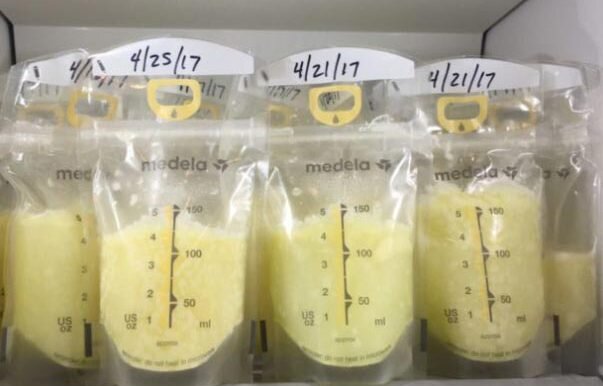Iran ranks first in West Asia for breast milk banks

TEHRAN – Iran ranks first in West Asia for breastfeeding of immature newborn infants, as 11 breast milk banks have been established in the country, head of mother’s milk bank of Al-Zahra hospital in the northwestern city of Tabriz has stated.
Breast milk donation is as important as blood donation due to saving lives of so many premature babies in hospitals whose best nutrition is breast milk, Mohammad-Baqer Hosseini told IRNA on Saturday.
Recalling that breast milk banks are widely active all over the world, he said that milk banks have been active in European countries for nearly 100 years.
Worldwide, about 600 breast milk banks have been established, with the first established in Austria, he noted, adding, there are currently 210 breast milk banks in Europe and Brazil alone has 210 milk banks.
Human milk is pasteurized so that there is no risk of transmitting infectious diseases, even in case of AIDS or any other diseases, he said.
He went on to explain that mothers who have insufficient milk volume for any reason, including multiple births, can receive their baby's required consumption from the milk bank. Also, babies born prematurely, such as a baby weighing 600 grams at 26 weeks, or premature babies born with diseases such as gastrointestinal disease and cannot feed on infant formula.
Mothers who have more milk than their children need can donate milk. The milk is taken to the milk bank by health centers and pasteurized, then the necessary tests are performed on it and stored in special containers in portable refrigerators and freezers, he added.
In July 2016, the first breast milk bank was established in Al-Zahra Hospital of Tabriz University of Medical Sciences, with the financial support of the Ministry of Health, he stated.
Since then, 10 breast milk banks have been set up in the country, two of which are located in Tehran, and others in Mashhad, Zahedan, Ahvaz, Kermanshah, Shiraz, Kerman, Tabriz, and Yazd are active and one is being launched in Isfahan, he said.
Breastfeeding a unique process
Breastfeeding provides ideal nutrition for infants and contributes to their healthy growth and development while reducing the incidence and severity of infectious diseases, thereby lowering infant morbidity and mortality, and contributing to women's health by reducing the risk of breast and ovarian cancer, and by increasing the spacing between pregnancies. It also provides social and economic benefits to the family and the nation and provides most women with a sense of satisfaction when successfully carried out.
Recent research has found that these benefits increase with increased exclusiveness of breastfeeding during the first six months of life, and thereafter with increased duration of breastfeeding with complementary foods, and program intervention can result in positive changes in breastfeeding behavior.
Improving breastfeeding practices could save the lives of more than 800,000 children under 5 every year, the vast majority of whom are under six months of age.
Beyond survival, there is growing evidence that breastfeeding boosts children’s brain development and provides protection against overweight and obesity.
Mothers also reap important health benefits from breastfeeding, including a lower risk of breast cancer, ovarian cancer, and type 2 diabetes.
The life-saving protection of breastfeeding is particularly important in humanitarian settings, where access to clean water, adequate sanitation, and basic services is often limited.
Only about two in five children (42 percent), the majority born in low- and middle-income countries, were breastfed within the first hour of life. While this is a slight improvement from 37 percent in 2005, progress is slow.
Attainment of this goal requires, in many countries, the reinforcement of a “breastfeeding culture” and its vigorous defense against incursions of a “bottle-feeding culture”. This requires commitment and advocacy for social mobilization, utilizing to the full the prestige and authority of acknowledged leaders of society in all walks of life.
World Breastfeeding Week 2020
World Breastfeeding Week (WBW) is a global campaign to raise awareness and galvanize action on themes related to breastfeeding, celebrated annually on August 1-7 in commemoration of the 1990 Innocenti Declaration.
Started in 1992, WBW’s annual themes include healthcare systems, women and work, the International Code of Marketing of Breastmilk Substitutes, community support, ecology, economy, science, education, and human rights. Since 2016, WBW is aligned with the Sustainable Development Goals (SDGs).
In 2018, a World Health Assembly resolution endorsed WBW as an important breastfeeding promotion strategy.
WBW 2020 will focus on the impact of infant feeding on the environment or climate change and the imperative to protect, promote, and support breastfeeding for the health of the planet and its people.
The theme is aligned with thematic area 3 in the WBW-SDG 2030 campaign which highlights the links between breastfeeding and the environment and climate change.
The World Alliance for Breastfeeding Action (WABA) applies the warm chain approach of working together across sectors and levels to make common cause with groups working on environmental issues. Together, we need to emphasize the link between breastfeeding and the environment.
FB/MG
Leave a Comment